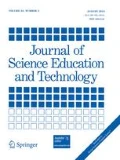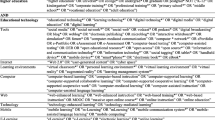Abstract
Physical field trips to scientists’ work places have been shown to enhance student perceptions of science, scientists and science careers. Although virtual field trips (VFTs) have emerged as viable alternatives (or supplements) to traditional physical fieldtrips, little is known about the potential of virtual field trips to provide the same or similar science career exploration advantages as physical field trips. The overarching goal of this paper is to describe a VFT, zipTrips™, designed to provide middle school students, especially those in resource limited rural areas, with access to university scientists. Using zipTrips as a case example, the paper identifies and describes some of the core characteristics and elements of high quality authentic VFTs that foster student-scientist interactions. In addition, the paper uses program evaluation data to examine the impact of zipTrips on student perceptions of scientists.
Similar content being viewed by others
References
Adedokun OA, Loizzo J, Parker LC, Burgess W (2010) Factors influencing 6th grade students’ perceptions of an electronic fieldtrip. Paper presented at the 2010 Annual Visitor Studies Association Conference, Phoenix, July 29–31
Adedokun OA, Parker LC, Loizzo J, Burgess WD, Robinson JP (2011) A field-trip without buses: connecting your students with scientists through an electronic field-trip. Sci Scope 34(9):52–57
Beale AV (2000) Elementary school career awareness: a visit to a hospital. J Career Dev 27(1):65–72
Chambers DW (1983) Stereotypic images of the scientist: the draw-a-scientist test. Sci Educ 67(2):255–265
Cox ES, Su T (2004) Intergrating student learning with practitioner experiences via virtual fieldtrips. J Educ Media 29(2):113–123
Duffy TM, Cunningham DJ (1996) Constructivism: implications for the design and delivery of instruction. In: Jonassen DH (ed) Handbook of research for educational communications and technology. Simon and Schuster macmillan, New York, pp 170–198
Elleven R, Wircenski M, Wircenski J, Nimon K (2006) Curriculum-based virtual field trips: career development opportunities for students with disabilities. J Vocat Special Needs Educ 28(3):4–11. Retrieved from http://www.specialpopulations.org/Vol%20283%20Chapters/Elleven_V28-3.pdf
Falk JH, Balling JD (1982) The field trip milieu: learning and behavior as a function of contextual events. J Educ Res 76(1):22–28
Farenga SJ, Joyce BA (1999) Intentions of young students to enroll in science courses in the future: an examination of gender differences. Sci Educ 83(1):55–75
Finson KD (2002) Drawing a scientist: what we do and do not know after fifty years of drawing. Sch Sci Math 102(7):335–345
Garner LC, Gallo MA (2005) Field trips and their effect on student achievement and attitudes: a comparison of physical versus virtual field trips to the Indian River Lagoon. J Coll Sci Teach 34(5):14–17
Hodson D, Freeman P (1983) The effect of primary science on interest in science: some research problems. Res Sci Technol Educ 1:109–118
Hovell SR (2003) LEARNZ virtual field trips and the New Zealand curriculum: a teacher’s perspective. Unpublished M.S. Thesis, University of Otago, Dunedin, New Zealand. Retrieved from http://www.learnz.org.nz/downloads/dissertation-stephen-hovell.pdf
Jarvis T, Pell A (2002) Effect of the challenger experience on elementary children’s attitude to science. J Res Sci Teach 39:979–1000
Kisiel J (2006) More than lions and tigers and bears: creating meaningful field trip lessons. Sci Act 43(2):7–10
Knapp D (2000) Memorable experiences of a science field trip. Sch Sci Math 100(2):65–72
Lai K-W (1993) Teachers as facilitators in a computer-supported learning environment. J Inf Techol Teach Educ 2(2):127–137
Nazier GL (1993) Science and engineering professors: why did they choose science as a career? Sch Sci Math 93(6):321–324
Nespor J (2000) School field trips and the curriculum of public spaces. J Curriculum Stud 32(1):25–43
Newmann FM, Wehlage GG (1993) Five standards for authentic instruction. Educ Leadersh 50(7):8–12
Niemitz M, Slough S, Peart L, Klaus AD, Leckie RM, St. John K (2008) Interactive virtual expeditions as a learning tool: the school of rock expedition case study. J Educ Multimed Hypermed 17(4):561–580
Placing K, Fernandez A (2002) Virtual experiences for secondary science teaching. Aust Sci Teach J 48(1):40–43
Richardson V (2003) Constructivist pedagogy. Teach Coll Rec 105(9):1623–1640
Robinson L (2009) Virtual field trips: the pros and cons of an educational innovation. Comput N Z Sch 21(1). Retrieved from http://education2x.otago.ac.nz/cinzs/mod/resource/view.php?inpopup=true&id=60
Shaffer D, Resnick M (1999) “Thick” authenticity: new media and authentic learning. J Interact Learn Res 10(2):195–215
Stoddard J (2009) Toward a virtual field trip model for the social studies. Contemp Issues Technol Teach Educ 9(4):421–438
Varghese M, Hetzel K, Adedokun OA, Parker L, Burgess W, Loizzo J, Robinson J (2011) An evaluation of the impact of an electronic field trip on students’ perceptions of scientists. Abstract presented at the 2011 Annual Meeting of the National Association for Research in Science Teaching, Orlando, FL
Acknowledgments
Purdue zipTrips™ is a trademark of Purdue University. The project was developed with partial support from the Howard Hughes Medical Institute (Grant #51006097; PI: J. Paul Robinson). The contents of this paper are the authors' and do not necessarily represent the views or policies of the Howard Hughes Medical Institute. The authors acknowledge the assistance of Joan Crow, Carol McGrew, Steve Doyle, Sharon Katz, Julianne Bell, Rebecca Goetz, Ann Bessenbacher, Laurent Couetil, Lisa Hillard, Lori Corriveau, the Indiana Higher Education Telecommunication System, the Indiana Public Broadcasting Service, and the teachers and administrators from several school corporations who assisted in the development of Purdue zipTrips.
Author information
Authors and Affiliations
Corresponding author
Rights and permissions
About this article
Cite this article
Adedokun, O.A., Hetzel, K., Parker, L.C. et al. Using Virtual Field Trips to Connect Students with University Scientists: Core Elements and Evaluation of zipTrips™. J Sci Educ Technol 21, 607–618 (2012). https://doi.org/10.1007/s10956-011-9350-z
Published:
Issue Date:
DOI: https://doi.org/10.1007/s10956-011-9350-z




